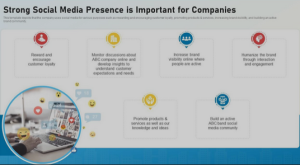Establishing a strong social media presence is crucial for companies in today’s digital age. Social media platforms provide a direct and interactive way for businesses to connect with their audience, build brand awareness, and engage in marketing efforts. Here are some key considerations for companies looking to enhance their social media presence:

Social Media Presence for Companies
-
Table of Contents
TogglePlatform Selection:
- Identify the social media platforms that align with your target audience and business goals. Popular platforms include Facebook, Instagram, Twitter, LinkedIn, Pinterest, and TikTok. Choose platforms where your audience is most active.
-
Consistent Branding:
- Maintain consistent branding across all social media profiles. Use the same logo, brand colors, and messaging to create a cohesive and recognizable identity.
-
Content Strategy:
- Develop a content strategy that aligns with your brand and engages your audience. Share a mix of content, including informative articles, visuals, videos, and user-generated content. Tailor your content to the preferences of each platform.
-
Regular Posting Schedule:
- Establish a regular posting schedule to maintain consistency and keep your audience engaged. Use scheduling tools to plan and automate posts, ensuring a steady flow of content.
-
Engagement and Interaction:
- Actively engage with your audience by responding to comments, messages, and mentions. Encourage discussions, ask questions, and show appreciation for user-generated content. Interaction helps build a sense of community around your brand.
-
Visual Appeal:
- Visual content is highly engaging on social media. Invest in high-quality images and graphics. Use eye-catching visuals to convey your brand message effectively.
-
Video Content:
- Incorporate video content into your strategy. Platforms like Instagram, Facebook, and TikTok provide opportunities for short-form videos, while YouTube is ideal for longer-form content. Video content is often more shareable and engaging.
-
Hashtags:
- Use relevant hashtags to increase the discoverability of your content. Research and incorporate industry-specific and trending hashtags to expand your reach.
-
Analytics and Metrics:
- Monitor analytics and performance metrics to assess the success of your social media efforts. Platforms often provide insights into reach, engagement, and audience demographics. Use this data to refine your strategy.
-
Paid Advertising:
- Consider paid advertising options on social media platforms to reach a larger audience. Targeted advertising allows you to tailor your messages to specific demographics and interests.
-
Employee Advocacy:
- Encourage employees to share company content and participate in discussions. Employee advocacy can amplify your reach and humanize your brand.
-
Crisis Management Plan:
- Have a plan in place for handling potential crises on social media. Respond promptly and professionally to negative comments or situations. Transparency and accountability are key.
-
Legal and Ethical Considerations:
- Be aware of legal and ethical considerations when using social media. Respect user privacy, adhere to platform guidelines, and ensure that your content complies with applicable laws and regulations.
-
Adapt to Platform Changes:
- Social media platforms evolve, and their algorithms change. Stay informed about updates and adapt your strategy to take advantage of new features or trends.
Remember that social media is a dynamic and ever-changing landscape. Regularly reassess your social media strategy, stay current with industry trends, and be responsive to your audience’s feedback and preferences.
